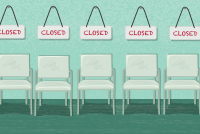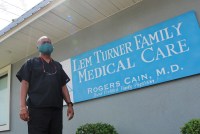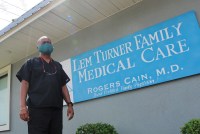After a Deadly COVID Outbreak, Maryland County Takes Steps to Protect Health Workers
Prince George’s County in Maryland is taking action after a coronavirus outbreak left veteran public health worker Chantee Mack dead and several colleagues with lasting medical problems. But some staffers say more still needs to be done to keep public health workers on the front lines of the COVID fight safe.
Thousands of Doctors’ Offices Buckle Under Financial Stress of COVID
Across the nation, primary care practices that were already struggling are closing, victims of the pandemic’s financial fallout. And this is reducing access to health care, especially in rural and other regions already short on doctors.
Musicians Improvise Masks for Wind Instruments to Keep the Band Together
Instrumentalists in ensembles, marching bands and other groups are getting creative with pantyhose, air filters, fabric and sewing machines to reduce the risk of COVID without silencing the music.
Moved by Plight of Young Heart Patient, Stranger Pays His Hospital Bill
A retired college professor in Las Vegas saw Matthew Fentress’ story and felt called to help. So she paid off $5,000 of his medical bill. “When you help other people, it gives you joy,” the Good Samaritan said.
Heartbreaking Bills, Lawsuit and Bankruptcy — Even With Insurance
With health insurance that can leave him on the hook for more than a quarter of his salary every year, a Kentucky essential worker who has heart disease is one of millions of Americans who are functionally uninsured. At only 31, he has already been through bankruptcy and being sued by his hospital. This year, he faced a bill for more than $10,000.
With No Legal Guardrails for Patients, Ambulances Drive Surprise Medical Billing
Studies show that at least half of ground ambulance rides across the nation leave patients with “surprise” medical bills. And a $300-a-mile ride is not unusual. Yet federal legislation to stem what’s known as balance billing has largely ignored ambulance costs.
Florida’s Cautionary Tale: How Starving and Muzzling Public Health Fueled COVID Fire
As the nation hollowed out its public health infrastructure for decades, staffing and funding fell faster and further in Florida. Then the coronavirus ran roughshod, infecting more than half a million people and killing thousands.
Cómo Florida drenó su sistema de salud pública y le abrió la puerta a COVID
A medida que la nación empezó a drenar su sistema de salud pública, personal y fondos cayeron más rápidamente en este estado, dejándolo desprotegido para la peor crisis de salud en un siglo.
Politics Slows Flow of US Pandemic Relief Funds to Public Health Agencies
Congress has allocated trillions of dollars to ease the coronavirus crisis. A joint KHN and AP investigation finds that many communities with big outbreaks have spent little of that federal money on local public health departments for work such as testing and contact tracing. Others, like Minnesota, were slow to do so. Bureaucracy has bogged things down, politics have crept into the process, and understaffed departments have struggled to take time away from critical needs to navigate the red tape required to justify asking for more money.
La política frena el flujo de fondos a las agencias para frenar la pandemia
Desde que comenzó la pandemia, el Congreso ha reservado miles de millones para aliviar la crisis. Pero parte de ese dinero no se ha distribuido, o gastado, apropiadamente.














